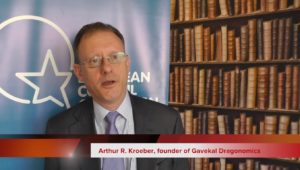
Building more infrastructure has been a receipt for China to keep its economy growing double-digit for a long time. But that old growth model is no longer working, tells economist Arthur Kroeber, author of China’s Economy: What Everyone Needs to Know® in an interview with QZ.
QZ:
Arthur Kroeber: I think there are two reasons why it doesn’t work anymore. One is that when you’re in that phase of growth, a lot of what you’re doing is building the enabling infrastructure. So you’re not just building the factories. You’re building the housing. You’re building the roads. You’re building the power plants. You’re building the ports. You’re building the airports.
You’re building a lot of stuff.
That’s right. And eventually you get to the point where you don’t really need to build any more of that stuff. You can continue to grow your economy without additional power plants or that additional port. You can just use [what you have] more efficiently.
And it doesn’t actually help to build a third power plant when you’re already getting enough power from the first two.
Yeah that’s exactly right. So, part of the growth over the last 30 years was building all the infrastructure. And that job isn’t completely done. But it’s done enough so that it becomes a much much smaller part of the equation.
So is that why China’s GDP growth has slowed down? They’re still building a lot of infrastructure as we speak, but those large projects don’t generate the GDP pop that they used to?
Well I think there’s a couple ways you can look at this. The simplest way is to say that for 30 years roughly, from 1980 until four or five years ago, China was growing at about 10% a year on average. And roughly speaking, half of that growth came from the creation of new capital—new roads, new ports, etc. And the other half of that came, essentially, from productivity growth.
So you take someone off the farm where he’s producing a value of maybe $300 a year, and you put him into a factory and automatically he’s producing $3,000 a year. So you get a huge productivity jump.
And that by the way is the classic story of economics, whether it’s a Scottish guy going to work in the textile mills of northern England in the 19th century or an American farmer moving to Pittsburgh to work in a steel mill.
Exactly. Now we’re at a point where because you built all this capital, you have basically the capital stock that you need. You can’t get five points of growth by adding capital. It just doesn’t produce that much value.
Arthur Kroeber is a speaker at the China Speakers Bureau. Do you need him at your conference or meeting? Do get in touch or fill in our speakers´request form.
Are you looking for more political experts at the China Speakers Bureau? Do check out this list.





